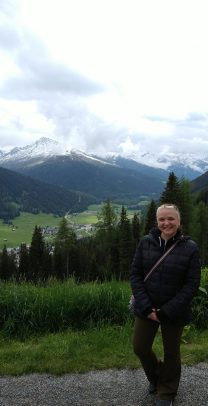UIC students awarded German Academic Exchange Service research grants
By Elizabeth Maher
Two doctoral candidates in Germanic studies at the University of Illinois Chicago have been awarded one-year research grants by the Deutscher Akademischer Austauschdienst, or the German Academic Exchange Service.
DAAD research grants support exceptional doctoral candidates conducting research at German universities and institutions. In 2021, PhD candidate Maryann Piel received a year of funding to work with Christian Klein at the University of Wuppertal. Piel is spending the 2021-2022 academic year in Germany conducting research, writing and leading seminar discussions based on her dissertation research. Piel previously earned a master’s in Germanic studies at UIC and was a fellow at the Notre Dame Berlin Seminar.
More recently, PhD candidate Phillip Cabeen has been awarded a grant to work with Christoph Rauen at Christian-Albrechts University of Kiel during 2022-2023. Cabeen previously earned a Bachelor of Arts degree at UIC and a Master of Arts in Teaching at Columbia College.
Piel’s dissertation, entitled “Self-Made Royalty: Celebrity in German Literature,” utilizes celebrity studies as “a new lens through which to read German literature.” Piel explained that she is “especially interested in the ways in which age, gender and class interact in the worlds of the famous and fame-seeking, both within the representative literary works and for the authors themselves, as a means to better understand the gendered disparities present in the German literary canon.” The DAAD grant allowed Piel to conduct archival research at the Thomas-Mann-Archiv in Zurich and the Deutsches Literaturarchiv in Marbach.
Cabeen will also be conducting archival research during his grant. His dissertation is on popular music in the Federal Republic of Germany between 1978 and 1982. Cabeen explained that he is “using affect theory to explore how musicians in that moment enacted new strategies for meaning-making, invoking multiple and contrasting emotions in their songs, and thereby posing a direct challenge to elder generations.” Cabeen said that in addition to working on his dissertation, he is “excited to work more closely with a German professor and in the context of the German academic system.” He also hopes “to establish relationships with individuals and institutions (the archives, for example) that will aid future research and exchanges, including that of future students and peers.”
This type of research funding is invaluable for graduate students.
“The opportunity to spend almost a year focused on my dissertation is a huge opportunity,” Cabeen said.
“These kinds of intensive, long-term research visits are life-changing and essential for our students working in Germanic studies,” said Heidi Schlipphacke, director of graduate studies for the department of Germanic studies and Piel’s adviser.
Schlipphacke emphasized that the DAAD research grants would allow Piel and Cabeen to conduct critical archival research.
“This kind of sustained and intensive work with primary materials will give their dissertations a level of depth and breadth that they could not have otherwise had,” she said.
DAAD research grants are prestigious and applying is a difficult but rewarding process. To be competitive, students must build connections with German scholars who are experts in their field. These expert researchers then decide whether they want to invite the student to conduct research at their institution.
“The DAAD is a premiere funding agency supporting scholars conducting research in or about Germany or based in sources or labs located there,” said Sara Hall, Cabeen’s adviser. “The fact that Phill and Maryann garnered highly competitive DAAD dissertation fellowships in support of their respective cultural and literary studies projects is a testament to the originality, value and anticipated impact of their work on an international scale.”
Piel and Cabeen credit their advisers, as well as Benn Williams, fellowships and awards coordinator in the Graduate College and UIC’s liaison for DAAD, with providing them invaluable feedback to help them strengthen their applications.
“I received great advice and assistance from my faculty mentors and from Benn Williams, who further arranged for additional external readers to review my application materials. Making time to carefully review and incorporate all of that detailed feedback was a challenge but it was also extremely fruitful. Of course, I’m thrilled to have been awarded the stipend, but the process helped to sharpen my writing and advance my thinking about the project.” Cabeen said.
“For me, the whole application process seemed really daunting at first, but with the help of my adviser, each draft of the application documents I prepared became stronger,” Piel said. “So, I would advise to work closely with an adviser or professor and be willing to work through a few versions of the application. It’s worth the effort — not only for applying for the fellowship, but also as an exercise in making a case for the importance of your project.”
One of the most valuable aspects of applying for a funding opportunity like the DAAD research grant comes from the work of writing the application. Writing a funding application can often give researchers new insight as to the contribution their work is making.
“The ‘fellowship process’ can seem quite daunting at any stage of one’s career, but the reward can reshape the recipient’s scholarship as well as their Lebenslauf [life trajectory]. It is worth the journey. Maryann and Phill persisted and were a pleasure to work with,” Williams said. “We hope that more UIC graduate students will seek out these types of internationalizing funding opportunities.”
Learn more about the DAAD online. For assistance finding other funding opportunities, go to the Graduate College’s Funding and Awards page. Graduate students seeking support with their fellowship applications can contact Williams (bwilli7@uic.edu) and Lindsay Marshall, the Graduate College’s writing specialist, at lmarsh4@uic.edu.
Categories

